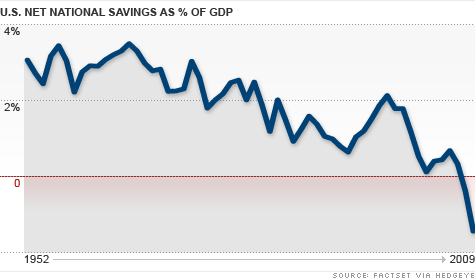 |
| Source: CNN Money |
 |
| Source: The Economic Collapse Blog (total debt = government, business and consumer debt combined_ |
.svg/800px-Chart_of_US_Top_1%25_Income_Share_(1913-2008).svg.png) |
| Source: Fred the Oyster at commons.wikipedia.org |
I think the three trends shown in the graphs above are related. After World War II there was a long term trend in reduced savings in the United States and a long term trend of increasing debt. After 1980 the top one percent took an increasing share of earnings. We got greedy! We were unwilling to invest for the long run, and wanted a lot and we wanted it now. (Note that rich people could get richer and richer by leaving their profits in the companies that made them, seeing their shares increase in value untaxed; the rich get lots of income when they take profits in the form of income rather than let them accumulate as capital.)
Against this background, a poorly regulated financial industry created more and more complex derivative instruments. People were led to buy these (often for institutions) not recognizing the risk involved. Banks were able to make profits by making sub-prime mortgage loans, encouraging people to buy houses at prices that they could not afford, and to shift the risk in those mortgages to unwary investors in those derivatives. There followed a housing bubble as the resulting increased demand for houses drove up their prices. The construction industry responded by building more and more housing.
Then came the crash. The housing bubble burst, the construction industry crumbled, banks failed, the derivatives plummeted in value, investment banks went bust, loan money dried up, businesses stopped investing in new products and expansion, jobs were lost, people (who had little or no savings) got cautious and stopped buying, and the Great Recession ensued.
European nations responded with government budget cuts and are now in recession again and a new financial crisis. The U.S. responded with fiscal and monetary policy stimulus, and the economy seems to be in (a fragile) recovery.
The underlying problems remain. In order to grow the economy of the United States over the long run, we will have to invest in innovation and capital development. I think we will have to reduce rent seeking by the richest and increase economic mobility for the poor and the middle class. Government policy should encourage innovation, providing tax incentives and indeed investing in new technologies. Regulations should not only keep businesses honest, assure that investors understand the risks inherent in their investments, but also provide incentives as mileage standards for autos do. We should invest in education, and do so in a way that educates all of our kids (Blacks, Hispanics and Whites as well as Asians) to excel in school. We should invest in infrastructure that makes our economy internationally competitive (not that provides inappropriate advantages to aging industries).
No comments:
Post a Comment